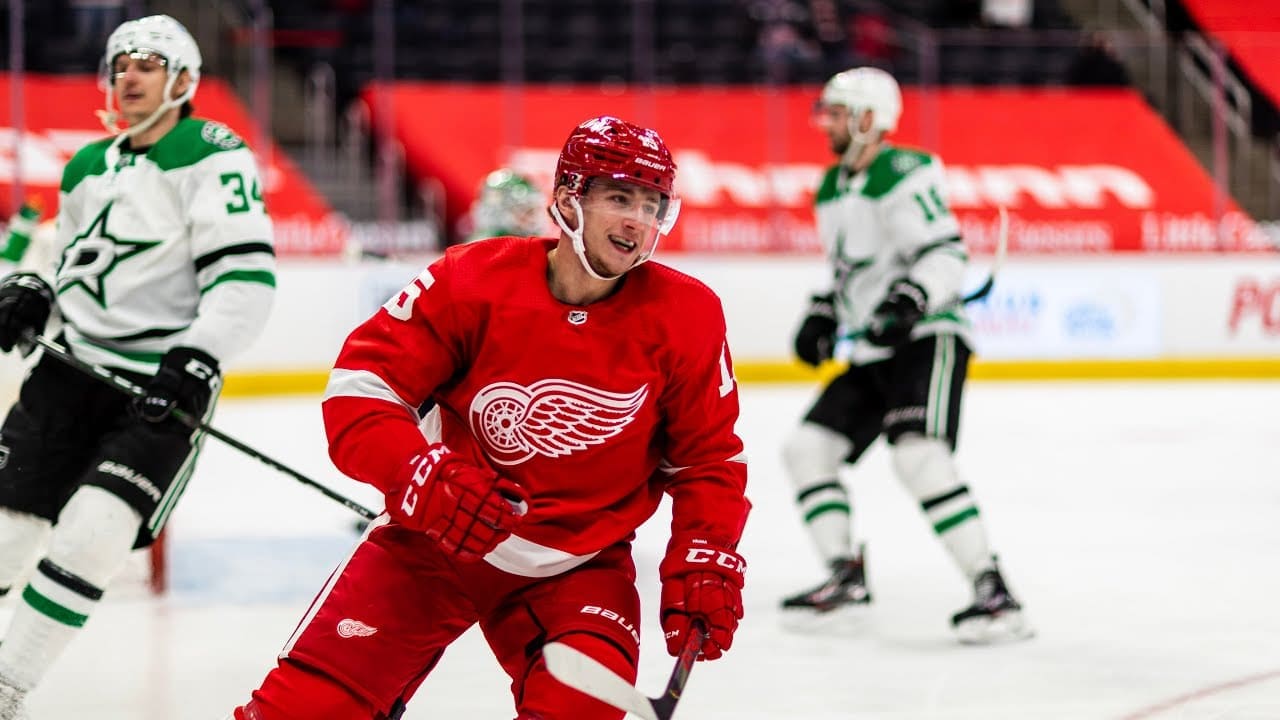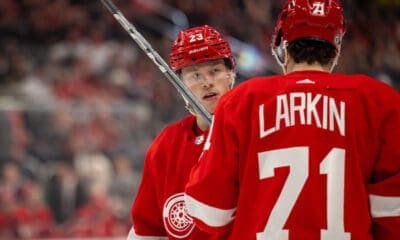Detroit Red Wings
Guest Column: Vrana Absences Hurt the Value of Yzerman’s Big Trade
Jakub Vrana has played just 39 of 100 games since joining the Red Wings

(Editor’s Note: Paul Harris has covered all levels of hockey in the Detroit area and Michigan for more than 30 years and has covered the Red Wings for 28 years. He was the editor of Hockey Weekly for almost 19 years and also worked for the Detroit News and was a freelancer for The Hockey News, the Associated Press and NHL.com, among other publications and websites.)
While in on-ice performance as a Red Wing Jakub Vrana has been far superior to that of Anthony Mantha’s in quality, the quantity of the times that Vrana hits the ice wearing the winged wheel is becoming an issue. Mantha, the 6-5, 230-pound left wing with seemingly every talent – size, a great shot, outstanding passing ability and speed, particularly for his size – perpetually underachieved when playing in Detroit. That vexed Red Wings fans a great deal.
The biggest issues were that Mantha did not seem to be fully engaged much of the time, continually lost puck battles that a man of his size and strength should win and was hesitant to shoot the puck despite his outstanding wrist shot. And while his numbers weren’t bad, most agree his peak production should have been more than 25 goals in 67 games during the 2018-19 season and 24 goals in 80 games the previous season. He reached his career high in points with 48 in both of those campaigns.
So, at the trading deadline of the pandemic-shortened 2020-21 season, Red Wings general manager Steve Yzerman dealt the then-26-year-old Mantha, who had 11 goals and 21 points in 42 games to that point that year, to the Washington Capitals for Vrana, grinder Richard Panik and two draft choices (one in the first round and the other in the second round).
Vrana A Productive Red Wing . . . When He Plays
Also a left wing, Vrana, was 25 when he became a Red Wing. His production as a Capital had been similar to Mantha’s with the Red Wings: 24-23-47 in 82 games in 2018-19, 25-27-52 in 69 games the following season and 11-14-25 in 39 games in 20-21 at the time of the trade.
According to the numbers the two former first-round picks (Mantha 20th overall in 2013 and Vrana 13th overall in 2014) were equals. But what the raw stats do not tell us was that Mantha played on the first line with Detroit’s two best players in Dylan Larkin and Tyler Bertuzzi. Vrana was mostly settling for third-line minutes with the tremendously talented Capitals, who won the Stanley Cup in 2018.
Detroit Golt Plenty Of Value From Deal
Regardless of what Mantha and Vrana accomplish, Yzerman is the winner in the deal thus far because he also received Washington’s first-round draft pick in 2021 and second-round pick in 2022. He traded the first rounder to move up to the No. 15 spot and draft goalie Sebastian Cossa. He is now with the Griffins and is considered the team’s goalie of the future. Yzerman used the second rounder a few months ago to claim promising young Russian forward Dmitri Buchelnikov.
But Vrana and Mantha are the spotlight players of the deal.
And since consummation of the deal, Vrana’s productivity is exceeding that of Mantha … when Vrana is on the ice. Vrana has been limited to 39 games as a Red Wings player. He boasts 22 goals, which projects to 40-plus goals over a full season. He also has 10 assists in those games. In that time, Vrana has showcased a lethal shot and the ability to score from anywhere in the offensive zone and blazing speed.
But shoulder surgery kept him out of all but the final 11 games last season and Vrana entered the NHL’s Players Assistance Program after the team’s first two games this season.
Now, Vrana’s condition as a human being is of far more important than any aspect of his role as a hockey player. The priority is, and should be, on dealing with his issues through the assistance program. He is where he needs to be.
But from the hockey standout, he’s not playing again.
Thus, the Red Wings traded a player who they could never depend on to reach his potential. In return, they received a skater who gives them almost everything they need.
But that’s only when he plays. And he hasn’t played often enough.















